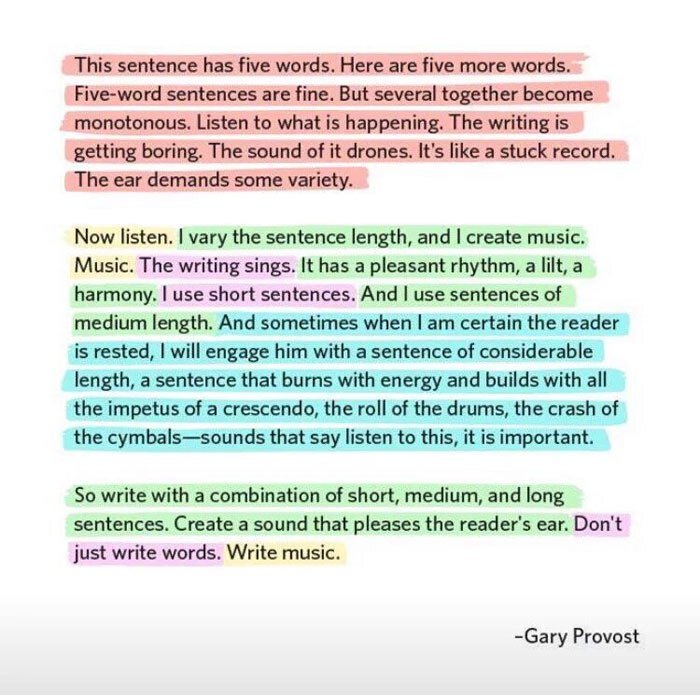the words you use matter
“The limits of my language mean the limits of my world - Wittgenstein
The language we use constructs the narrative we believe in. It conveys how you are feeling to yourself and to others. Therefore a finer, more accurate use of language, allows more information to be conveyed. You can be better understood. You can ask better questions. Ultimately you can connect.
Language is the medium we have to convert electrochemical energy in the form of thoughts, into vibrational energy in the form of speech, and then back. It’s the arguably the transmission of thought, with the added filter of being able to lie or distort thought. It’s a vital skill.
I want to explore some unspoken rules about language, that can make the way I communicate, clearer.
How to use words
Context Dependent
Use language based on the context you are in. Don’t use the word ‘epistemology’ to explain a concept to a 5 year old.
Simplicity
Using fancy words and long sentences should only be used to the extent that it makes an idea clearer.
Words are vehicles to convey meaning. The more advanced the word, the smaller the audience will be that knows what you mean.
I tend to use long sentences. But if the same message can be conveyed with fewer words, that is better. Hemingway is a good example of this.
Pausing is better than filler words
I tend to use ‘cool’ and ‘like’ as filler words when thinking.
It just makes you appear more nervous, more uncertain, and less articulate.
It is far better to pause. It feels much longer than it is, but that pause allows you to construct a logical chain of points that in the end, makes your point clearer.
Expand your vocabulary
Read more. Not only that, read more, and write down words that you do not know. Write that novel you’ve been meaning to write. Write incoherent blog posts. Write that twilight fan fiction that becomes 50 shades of grey.
Actually. Don’t do that last one.
Then use the words in your daily life. I noticed that the sole word I used to describe a good situation was, well… good. I kept saying good to everything. ‘That sounds good’. ‘You look good’. I am ‘good’.
The word good, suddenly became a catchall. Instead of using more precise words to convey feeling, it ended up just being ‘good’.
The real downside is that you can fail to communicate how you feel to yourself and those around you. You can miss opportunities for meaningful connection, and that is a real shame.
A Conversation is inversely proportional to the number of participants
“Two is company. Three is a crowd” The more people you have in a conversation, the lower the quality of the conversation.
You end up talking about superficial topics. Everyone talks, but no-one listens. There is no real deeper connection formed. This is not a bad thing, but as an introvert, I find that unsatisfying.
I would much rather spend time with 1-2 people at most and really ask difficult questions, that you couldn’t ask in a group setting. All driven by a curiosity about human nature. I think at a core level, all human beings are the same. We are driven by desire and aversion, we want the same things. To love and be loved. It’s just that society and culture layers on top of these shared common values.
Spending time with one person, you can explore your shared humanity and values, realising that at a fundamental level, you are the same. That I think, is beautiful.
Silence
If you have nothing to say at all, then be silent. When people talk about awkward silences, I strangely don’t feel awkward at all. Maybe that’s atypical, but I don’t feel the need to fill the air constantly with words. I then tend to get labelled as being quiet and introverted, and apparently mysterious. This makes me sound much cooler and introspective than I probably am. It’s just when I have nothing to say, I don’t say anything. Saves a lot of mental bandwidth.
Learn a foreign language
“Those who know nothing of foreign languages know nothing of their own” Goethe
I think the above statement is probably exaggerated. But the point is, there are 1000’s of languages. Learn one you will use.
Don’t Lie
Not even white lies. There is a fantastic little book written by Sam Harris called ‘Lying’, that details why all lying is ultimately harmful.
Worth a read. If you want mental peace, control over yourself rather than others and internal silence, don’t lie.
Flow

Good writers tend to intersperse long sentences with shorter ones. This creates flow. Then once in a while, they go for a dangerously long and convoluted sentence, one in which you can’t really sense the end or the beginning anymore, it’s just a cacophony of words that if done properly, is immensely gratifying. Then you can return back to short.
The point is, using sentences of the same length can convey monotony. But using longer and shorter sentences creates flow.
Conclusion:
Most of these blog posts really have no defined structure. They just tend to be a menagerie of ideas about a topic that I end up thinking about on Sunday mornings, and then solidify into sentences.